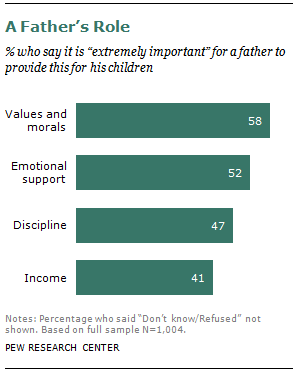
Being a father in this era of changing family structures and converging gender roles means more than bringing home a paycheck or delivering punishment to a misbehaving child. A new survey by the Pew Research Center finds that Americans expect dad to be more of a moral teacher and emotional comforter than a breadwinner or disciplinarian.
About six-in-ten Americans (58%) say it is “extremely important” for a father to provide values and morals to his children, the top ranked paternal role of the four tested in the survey. Roughly half say it is extremely important for a dad to provide emotional support (52%) and discipline (47%). And just 41% say providing income for his children is one of a father’s most important responsibilities, according to the nationally representative survey of 1,004 adults conducted June 6-9.
Fathers and Mothers
When the same question was asked about the role of mothers, the survey produced roughly the same hierarchy of responses, with values and emotional support at the top and income at the bottom.
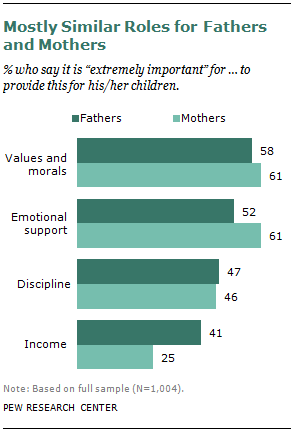
But there are also some differences in the way the public weighs the roles of mothers and fathers, especially when it comes to being an income provider. Just 25% of survey respondents say this is an extremely important role for mothers, compared with 41% who feel that way about fathers.
That gap is notable in light of a recent Pew Research Center report, based on U.S. Census Bureau data, which showed that mothers are the sole or primary breadwinner in 40% of all households that have a child or children under the age of 18, up from 11% in 1960.
There is also a gap, albeit a smaller one, when it comes to providing emotional support to children. Some 61% of survey respondents say this is an extremely important role for mothers, compared with 52% who say the same about fathers.
Nearly equal proportions of respondents say it is “extremely important” for fathers (58%) and mothers (61%) to provide values and morals to their children. Both parents are also viewed as having an equally strong responsibility to discipline their children (47% for fathers and 46% for mothers).
The Survey Question
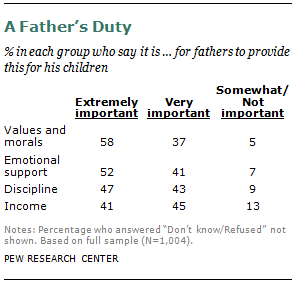
In the survey questionnaire, the importance of each paternal role was measured on a scale that ranged from “extremely important,” “very important, “somewhat important,” “not too important” and “not at all important.” A parallel set of questions asked about the importance of these roles for mothers. (See Appendix for exact question wording.)
Overwhelming majorities of Americans believe that all four roles are important. About nine-in-ten (86%) say providing income is “extremely important” or “very important” for a father. Even larger proportions place equal importance on a father’s responsibility to provide discipline (90%), emotional support (93%), and values and morals (95%).
Demographic Patterns
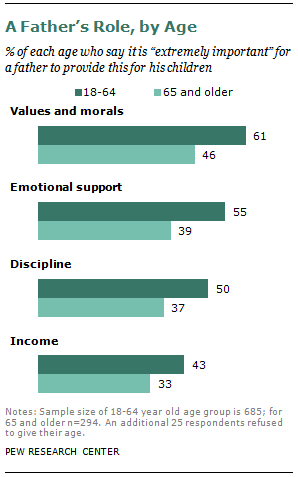
There are some differences by age, race, parental status and gender in the pattern of responses.
Adults under the age of 65 are consistently more likely than older people to say that it is “extremely important” for a father to provide each of the four items tested for his children.
For example, about six-in-ten (61%) of adults younger than 65 say it is “extremely important” for a father to provide values and morals to his children. By contrast, 46% of those 65 and older agree.
Adults under the age of 65 also are more likely than those 65 and older to place high value on a father’s role in disciplining children (50% vs. 37%), offering emotional support (55% vs. 39%) and providing an income (43% vs. 33%).
Among respondents who are parents—about 70% of the sample—half say providing discipline is an extremely important duty for fathers, compared with 42% among those who are childless. However, parental status makes no difference when it comes to evaluating the importance of the three other roles tested in the survey.
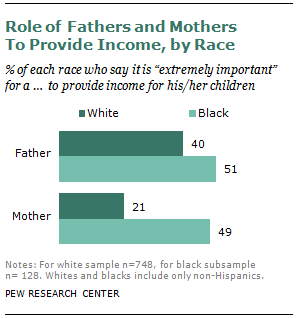
Blacks and whites1 broadly agree on the importance of three of the paternal roles tested in the survey. The one clear exception: the relative importance of both fathers and mothers to provide income to support their families.
According to the survey, blacks are far more likely than whites to see earning a living as a top responsibility of dads and moms. Fully half (51%) of blacks say providing income is “extremely important” for fathers compared with 40% of whites.
The gap more than doubles when blacks and whites are asked about how important it is that a mother provide income for her children. Again, about half (49%) of blacks but only 21% of whites say this is an extremely important role for moms.
Men and women have roughly similar priorities about a father’s most important role. Each gender places a father’s role as moral educator at the top of their lists (for women, emotional support ranks as highly). Earning an income ranks lower.
But the survey also found that women appear to place greater value than men on two of the roles tested in the survey.
The greatest difference emerged on the importance of a father providing emotional support to his children. About six-in-ten women (58%) but 46% of men say it is extremely important, a 12 percentage-point gap. A smaller gender difference occurred on questions measuring the importance of providing values and morals (a 7 point gap). Statistically insignificant gaps also occurred on the father’s role as disciplinarian (4 points) and breadwinner (3 points).
About the Survey
The survey findings presented in this report are based on an omnibus survey, conducted June 6 to 9, 2013, with a nationally representative sample of 1,004 adults living in the continental United States. Telephone interviews were conducted by landline (501) and cell phone (503). The survey was conducted by Princeton Survey Research Associates International (PSRAI). Interviews were done in English by Princeton Data Source. Statistical results are weighted to correct known demographic discrepancies. The margin of sampling error for the complete set of weighted data is plus or minus 3.7 percentage points at the 95% confidence level. The Pew Research Center for the People & the Press assisted in preparing the questionnaire.
Other Research on Fathers
Other recent Pew Research Center studies have explored the evolving role of fathers in the home and in family life. Among the major findings:
Fathers’ role in children’s lives
- Most Americans say that having a father in the home is essential to a child’s happiness. About seven-in-ten (69%) adults say that children need a father in the home to grow up happily. Only a slightly higher share (74%) says that about having a mother in the home. There is a gender difference on the importance of having a father in the home: 77% of men say it is essential, compared with 61% of women.
- But adults are split on whether today’s fathers have a more prominent place in their children’s lives than did fathers in decades past. When asked whether fathers generally play a greater or lesser role in raising children than did fathers 20 or 30 years ago, 46% say fathers play a greater role now, while 45% say today’s fathers play a lesser role.
See “A Tale of Two Fathers,” June 15, 2011
Fathers’ time at work and at home
- Fathers are more involved at home. According to findings from time use data, fathers’ time with children rose from 2.5 hours per week in 1965 to seven hours per week in 2011, nearly a threefold increase. During the same period, fathers’ time spent doing household chores has more than doubled (from an average of about four hours per week to about 10 hours).
- Married fathers work the most hours. Compared with single fathers and fathers who live with a partner, married fathers work the longest hours for pay and enjoy the least amount of leisure time. On average, time use data show they worked 39 paid hours per week, seven hours more than cohabiting fathers and five hours more than single fathers. On the other hand, married fathers have less leisure time: 27 hours per week, compared with 33 hours for cohabiting fathers and 31 hours for single fathers.
- Fathers work more hours for pay than mothers but do less housework and childcare. Although fathers have increased their time doing childcare and housework, time use data show they spend on average half the time that mothers do on these household tasks. However, fathers’ time in paid work is significantly higher than that of mothers (37 hours per week vs. 21 hours per week). As a result, the total workload for mothers and fathers is almost equal (53 hours and 54 hours, respectively).
See “Modern Parenthood,” March 14, 2013
How do fathers feel about their responsibilities?
- Fathers as well as mothers feel the stress of balancing work and family. According to a Pew Research Center survey, 56% of working moms and 50% of working dads find it very or somewhat difficult to juggle their responsibilities in these two areas. Similar shares of fathers (32%) and mothers (37%) say that they always feel rushed, even to do the things they have to do.
- Fathers want to stay home too. When asked about their preferences between staying at home raising children and working for pay, a nearly equal share of working mothers (52%) and fathers (48%) say they wish they could be at home, but they have to work because they need the income, according to a Pew Research survey.
- Fathers are less satisfied than mothers with the amount of time they spend with their children. Half of fathers say they spend the “right amount” of time with their children, compared with 68% of mothers, according to a Pew Research survey. Meanwhile, fathers are more likely than mothers to report that they don’t spend enough time with their children (46% vs. 23%).
- How good a job do fathers do? Fathers give themselves somewhat lower ratings than do mothers in a Pew Research survey: 64% of fathers with children under age 18 say they are doing an excellent or very good job as a parent, compared with 73% of mothers.
See “Modern Parenthood,” March 14, 2013
- Are today’s dads doing a better job at parenthood than their own fathers? Only 24% of adults say they are. A third (34%) say they are doing a worse job than their own fathers did, and 40% say they are doing just as well as their own dads. Fathers themselves are more upbeat: 47% say they are doing a better job than their own father did, 3% say they are doing a worse job and 47% say they are doing just as well as their own dads did.
See “A Tale of Two Fathers,” June 15, 2011
- Being a good father is highly valued in men as a quality for potential partners. In a 2010 survey, adults were asked to rate the importance of various qualities that make a man a good husband or partner. Fully 93% say that it is very important that a potential husband or partner be a good father. Also highly rated were men who put their families before anything else (82% say very important) and men who are caring and compassionate (89%). Only 41% say providing a good income is very important.
See “The Decline of Marriage And Rise of New Families,” November 18, 2010




